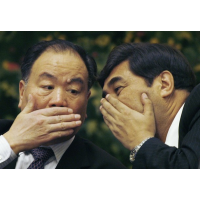Political Intelligence Firms: Wall Street’s Pipeline to Washington Draws Scrutiny

When investors on Wall Street want to know what Washington policymakers are thinking of doing before they act, they turn to a new kind of consultant: political intelligence firms.
These firms, which can help investors decide where to put their money in the stock market, are now coming under scrutiny from federal investigators to determine if any information is being illegally funneled between the nation’s political and financial centers.
There are estimated to be about 300 such firms operating in the U.S., comprising an industry that generates $100 million per year, according to congressional testimony given by Rep. Louise Slaughter (D-New York) in December 2011.
One example of political intelligence firms’ work involved the arrangement of meetings between Elizabeth Fowler, a one-time top health-policy adviser to President Barack Obama, and executives from at least six investment firms during the last two years.
Another instance involved a conference call between an official from the Centers for Medicare and Medicaid Services and managers of hedge funds, pension plans and mutual funds.
Hedge fund magnates and other investors are hungry to know in advance what Washington is up to in the areas of health care, defense, and other sectors, because policy decisions can have an enormous impact on stock prices.
So far, no evidence has surfaced showing the private discussions with the two administration officials about health-care matters provided investors with confidential government information or that the investors made trades based on what they learned, according to The Washington Post.
Nonetheless, members of Congress as well as federal investigators from the Securities and Exchange Commission and the Justice Department are looking at whether some traders have gained access to information not available to the public or investors in general.
After studying the controversial matter for a year, the Government Accountability Office last month released a report titled Political Intelligence: Financial Market Value of Government Information Hinges on Materiality and Timing (pdf). Some observers found it to be ineffective and lacking in solutions. The report “yields little insight,” wrote Dina ElBoghdady of The Washington Post. “We know as much now as we did before the report was written,” Citizens for Responsibility and Ethics executive director Melanie Sloan told Breitbart.
A political intelligence public disclosure rule had been included in the Stop Trading On Congressional Knowledge (STOCK) Act passed in 2012, but the language was removed from the bill prior to passage. Leading the campaign to strike down the rule were House Majority Leader Eric Cantor (R-Virginia) and then-Sen. Joseph Lieberman (I-Connecticut). It was their cozy relationship to the financial services industry that may have prompted their efforts, Government Accountability Institute president Peter Schweizer told Forbes magazine for an article on the subject.
-Noel Brinkerhoff, Danny Biederman
To Learn More:
Political Intelligence Firms Set Up Investor Meetings at White House (by Tom Hamburger, Washington Post)
‘Political Intelligence’ Encroaching on Insider Trading? (Washington Post) (video)
5 Wall Street Firms Fined Millions for Paying California Lobbyists with Taxpayer Bond Money (by Ken Broder, AllGov California)
House of Representatives Waters Down Insider Trading Bill to Protect “Consultants” (by Noel Brinkerhoff, AllGov)
- Top Stories
- Unusual News
- Where is the Money Going?
- Controversies
- U.S. and the World
- Appointments and Resignations
- Latest News
- Trump to Stop Deportations If…
- Trump Denounces World Series
- What If China Invaded the United States?
- Donald Trump Has a Mental Health Problem and It Has a Name
- Trump Goes on Renaming Frenzy






Comments